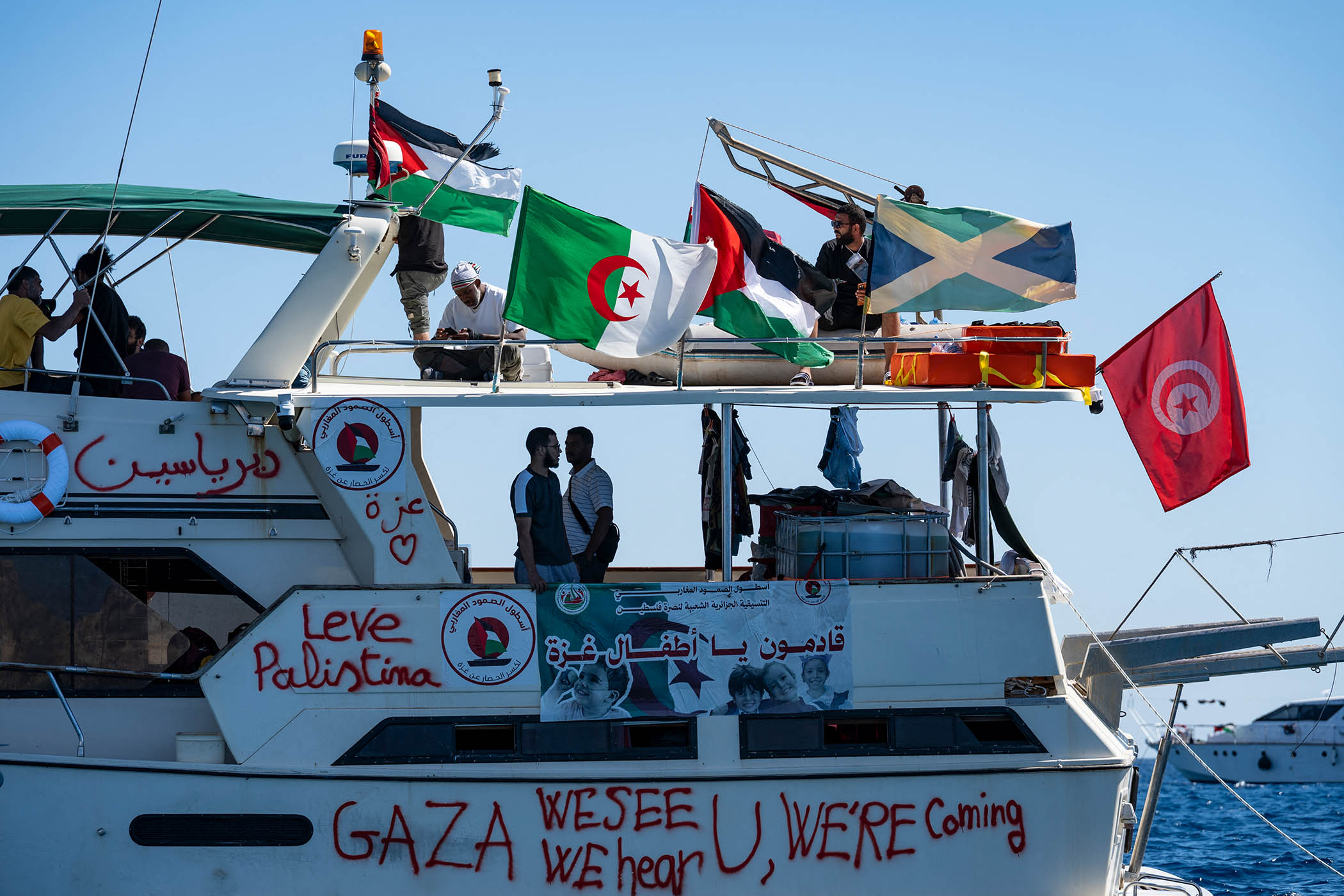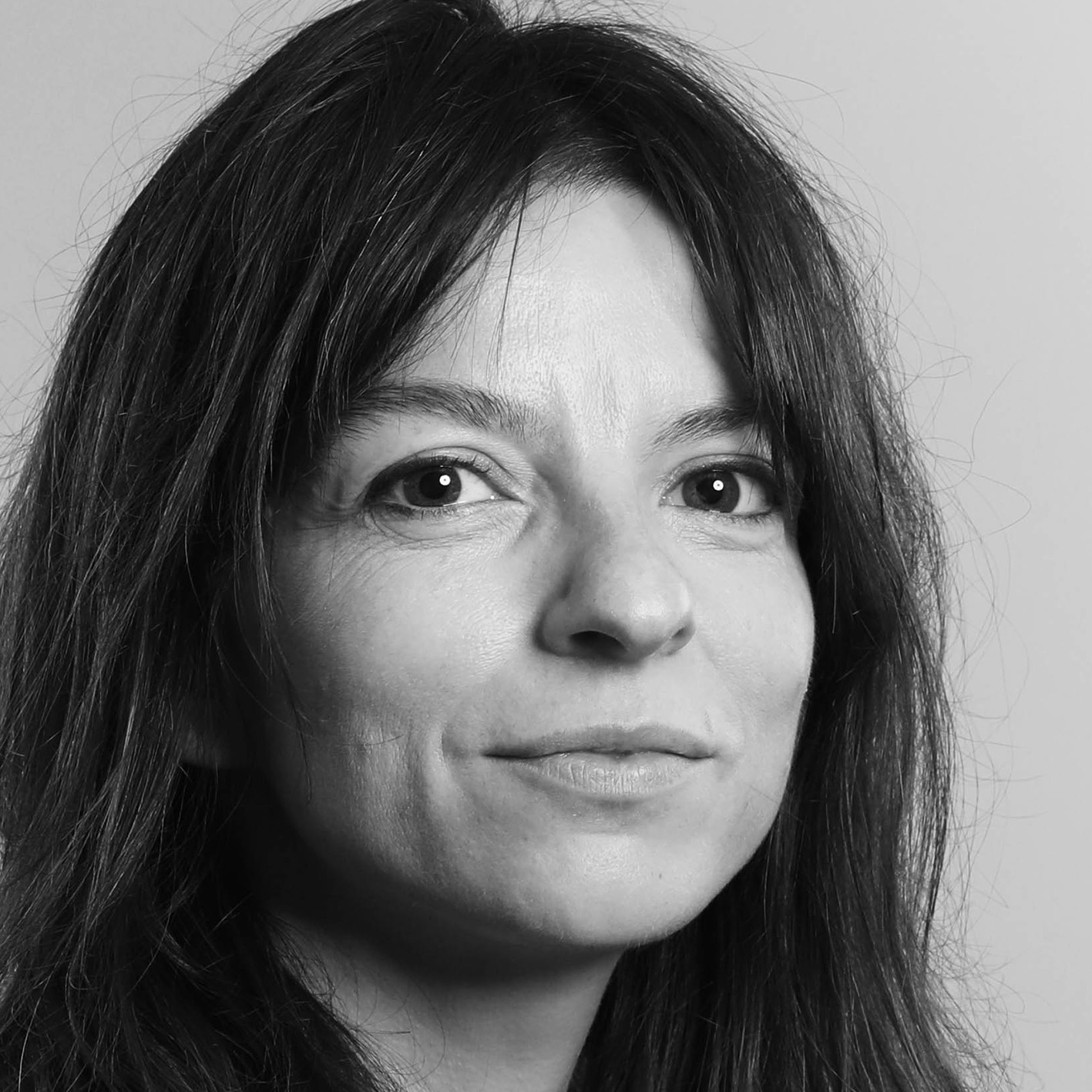Before embarking on the final leg of their mission to break an Israeli military blockade, activists gathered on deck of the Family Boat, for a briefing about the risks of the crossing to Gaza.
A day earlier, drones had attacked the flotilla of more than 40 boats in international waters, prompting Spain and Italy to deploy warships to the area. But the final and most dangerous part of the journey still lay ahead.
“This is our last safe port,” said Thiago Avila, a Brazilian activist and organiser of the Global Sumud Flotilla. “If someone believes that the risk is too much, this is the best moment to move to the land”.
None of the 28 activists on the boat took up the offer, according to one of the participants, who posted a video of the talk on Instagram.
This week, the boats are set to sail for Gaza with Palestinian flags in their rigging in the biggest attempt to break a blockade imposed by Israel 16 years ago. The group of several hundred activists from more than forty countries has been spurred by the failure of their own governments to restrain Israel. Aiming to put a spanner in a billion dollar war machine, the flotilla could reach Gaza within a week – if Israel allows it.
Nearly two years into the war, public opinion in many Western countries has shifted against Israel. More than 65,000 Palestinians have been killed in a campaign that a growing number of rights groups and experts, including a UN commission of inquiry, are calling genocide.
Faced with mounting domestic pressure, Western governments including the UK recently recognised Palestinian statehood, rebuking Israel for its conduct of the war.
As pressure mounts on Israel, its rhetoric has hardened. Having mocked an attempt to break the naval blockade earlier this year as a “selfie cruise”, Israeli authorities have branded the current effort a “jihadist initiative”. As the first boats departed from Spain earlier this month, Israel’s far-right national security minister Itamar Ben-Gvir called for the activists to be designated as terrorists. The foreign ministry has dubbed it a “Hamas flotilla”.
In international waters near Greece, multiple boats were hit with explosions that disrupted communications. Unidentified objects were dropped on or near multiple boats. The flotilla had previously been targeted by a suspected drone while docked off Tunisia.
Spain and Italy deployed warships in response to the latest attack as hundreds of European parliament members called for the flotilla’s protection. “They were obliged to do something,” said Paris Laftis, a 33 year-old software engineer from Greece who is travelling on a boat named after Pavlos Fyssas, a Greek rapper and anti-fascist activist. “It is proof of what people mobilising can achieve”.
Newsletters
Choose the newsletters you want to receive
View more
For information about how The Observer protects your data, read our Privacy Policy
Swedish activist Greta Thunberg, who was detained and deported by Israel after attempting to sail to Gaza in June, said several governments had contacted their citizens on board the flotilla to warn them of imminent attacks.
“Israel has, by desperately fabricated smear campaigns claiming we are terrorists, been laying the groundwork for attacks against us, using the same genocidal propaganda it deploys daily against Palestinians,” she said in a video filmed on one of the boats and posted on Instagram. “The closer we are to Gaza the bigger grows the risk of escalation”.
“The closer we are to Gaza the bigger grows the risk of escalation”
“The closer we are to Gaza the bigger grows the risk of escalation”
Greta Thunberg
The Israeli navy typically intercepts vessels before they enter Gaza’s territorial waters 20 nautical miles offshore, enforcing a blockade it says is aimed at preventing the smuggling of weapons to Hamas.
But the presence of European warships – along with the sheer number of boats involved – could complicate Israel’s response.
Retired navy commander Eyal Pinko said Israeli forces might wait for the flotilla to enter Gaza’s territorial waters before intercepting it to reduce the risk of escalation with the Italian and Spanish navies.
“For sure it will bring an inconvenient situation,” Pinko said, while dismissing the deployments as an empty gesture similar to the recognition of Palestinian statehood.
“Probably the commando unit will board the ship as it did last time with smiles, sandwiches, with water, with medical supplies, with no violence,” he said.
Previous interceptions have been less peaceful. Ten Turkish activists were killed when Israeli naval commandos boarded a flotilla in international waters in 2010 provoking a major diplomatic crisis. A UN panel of inquiry on the Mavi Marmara criticised Israel’s excessive use of force but found the blockade itself legal under international law. Other UN bodies, human rights groups and governments dispute that, however, saying it amounts to collective punishment of Gaza’s population.
Announcing the deployment of a second warship, Italy’s defence minister Guido Crosetto condemned the attacks on civilian boats, but warned he could not guarantee the safety of vessels outside international waters. “We are there to protect Italian citizens, but it is not our intention to move military ships to wage war on a friendly country,” he said.
“We are there to protect Italian citizens, but it is not our intention to move military ships to wage war on a friendly country”
“We are there to protect Italian citizens, but it is not our intention to move military ships to wage war on a friendly country”
Guido Crosetto, Italian defence minister
Italy’s prime minister Giorgia Meloni urged the activists to hand over the aid in Cyprus to be distributed by the church, criticising the flotilla as “dangerous and irresponsible”.
The activists dismissed a similar Israeli proposal as an effort to obstruct the delivery of humanitarian supplies to Gaza. Aid agencies have accused Israel of throttling aid flows to the coastal enclave, compounding a humanitarian crisis that has resulted in famine. The volume of aid being carried by the flotilla is negligible relative to the needs of Gaza’s 2 million residents.
“Why don’t they accept the Italian government’s proposal to make sure the aid is transferred to Gaza?” said Israeli Foreign Ministry spokesman Oren Marmostein. “The answer: this is not about aid. It’s about provocation.”
British medic Ben Bouquet joined the flotilla “to do something about the horror” after working for the World Health Organisation in Gaza and the occupied Palestinian territories for eight years. Watching the war unfold and the meagre response of the international community left him with what he can only describe as a profound moral injury.
“This is the first time I have been able to take action that is consistent with my own beliefs and the way I feel about the situation,” he said from a boat anchored in Greek waters. Named after a Palestinian journalist who was killed by the Israeli military, the Shireen Abu Akleh boat isn’t meant to go all the way to Gaza. But Bouquet is considering transferring to one of the vessels that intends to reach Gaza, so he can provide medical care if necessary.
“Obviously the threats are really high,” he said. “It has felt a little bit like we’re on the way to Mordor.”
On board, activists have been practising safety drills. The departure from Greece was delayed after the Family Boat suffered a mechanical failure. The organising committee said it could not rule out sabotage. The passengers transferred to other boats in order to continue the journey.
“If this flotilla can shed some light on what is happening there I think it is worth the risk and all the difficulties we have faced so far,” said the Greek activist, Laftis, who took part in a march to Gaza this summer that was aborted by Egyptian authorities. “Nothing can be compared with what the people of Gaza are facing right now.”
Photograph by Eleftherios Elis/ AFP via Getty Images

